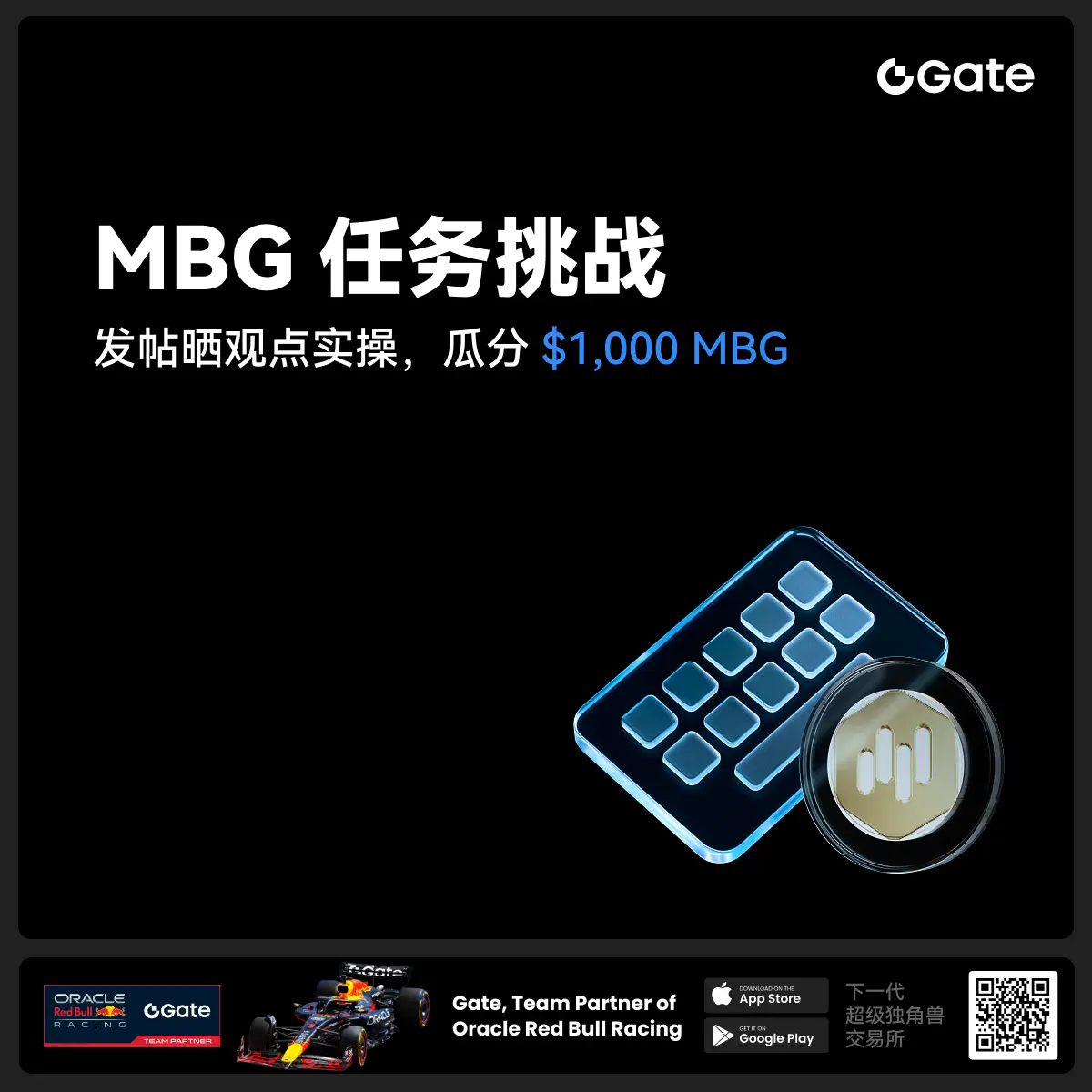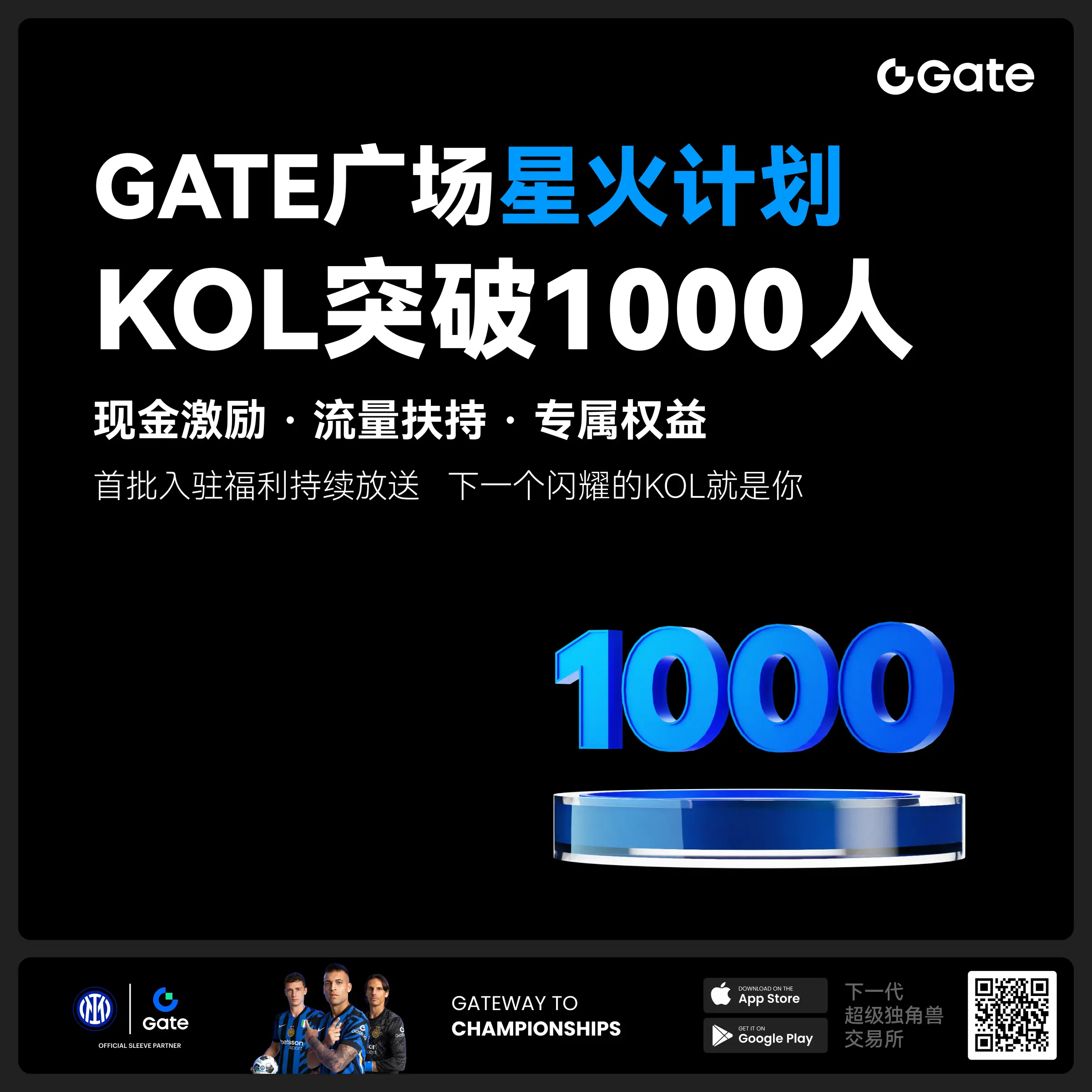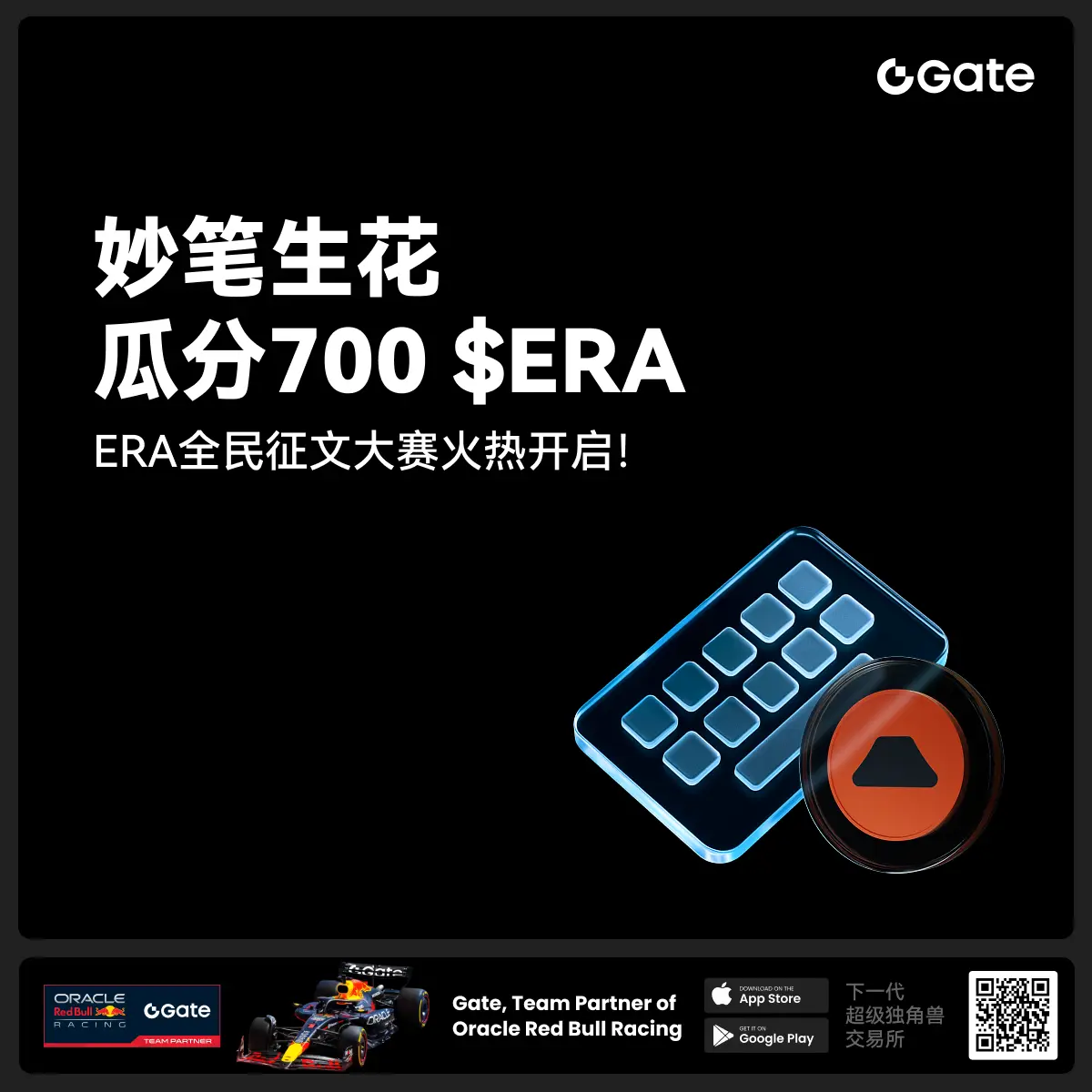- 话题1/3
8k 热度
18k 热度
13k 热度
53k 热度
23k 热度
- 置顶
- 📢 Gate广场 #MBG任务挑战# 发帖赢大奖活动火热开启!
想要瓜分1,000枚MBG?现在就来参与,展示你的洞察与实操,成为MBG推广达人!
💰️ 本期将评选出20位优质发帖用户,每人可轻松获得50枚MBG!
如何参与:
1️⃣ 调研MBG项目
对MBG的基本面、社区治理、发展目标、代币经济模型等方面进行研究,分享你对项目的深度研究。
2️⃣ 参与并分享真实体验
参与MBG相关活动(包括CandyDrop、Launchpool或现货交易),并晒出你的参与截图、收益图或实用教程。可以是收益展示、简明易懂的新手攻略、小窍门,也可以是现货行情点位分析,内容详实优先。
3️⃣ 鼓励带新互动
如果你的帖子吸引到他人参与活动,或者有好友评论“已参与/已交易”,将大幅提升你的获奖概率!
MBG热门活动(帖文需附下列活动链接):
Gate第287期Launchpool:MBG — 质押ETH、MBG即可免费瓜分112,500 MBG,每小时领取奖励!参与攻略见公告:https://www.gate.com/announcements/article/46230
Gate CandyDrop第55期:CandyDrop x MBG — 通过首次交易、交易MBG、邀请好友注册交易即可分187,500 MBG!参与攻略见公告:https://www.gate.com/announcements
- 🎉 Gate广场“星火计划”入驻KOL突破1000人!
💥 创作者生态迎来全面爆发期!
📈 上首页、拿奖励、赢影响力,你还在等什么?
💰 现金激励 ✔️
🚀 流量扶持 ✔️
👑 专属认证 ✔️
从0到1000,我们只用了短短数周,Gate广场正在成为Web3内容风暴眼⚡
你发布的不只是内容,而是下一个“爆款机会”!
🌟 加入星火计划,开启你的爆发之路!
👉 https://www.gate.com/announcements/article/45695
#GateSquare # #星火计划# #内容创作者新纪元 # #KOL集结令#
- 📢 #Gate广场征文活动第三期# 正式启动!
🎮 本期聚焦:Yooldo Games (ESPORTS)
✍️ 分享独特见解 + 参与互动推广,若同步参与 Gate 第 286 期 Launchpool、CandyDrop 或 Alpha 活动,即可获得任意奖励资格!
💡 内容创作 + 空投参与 = 双重加分,大奖候选人就是你!
💰总奖池:4,464 枚 $ESPORTS
🏆 一等奖(1名):964 枚
🥈 二等奖(5名):每人 400 枚
🥉 三等奖(10名):每人 150 枚
🚀 参与方式:
在 Gate广场发布不少于 300 字的原创文章
添加标签: #Gate广场征文活动第三期#
每篇文章需 ≥3 个互动(点赞 / 评论 / 转发)
发布参与 Launchpool / CandyDrop / Alpha 任一活动的截图,作为获奖资格凭证
同步转发至 X(推特)可增加获奖概率,标签:#GateSquare 👉 https://www.gate.com/questionnaire/6907
🎯 双倍奖励机会:参与第 286 期 Launchpool!
质押 BTC 或 ESPORTS,瓜分 803,571 枚 $ESPORTS,每小时发放
时间:7 月 21 日 20:00 – 7 月 25 日 20:00(UTC+8)
🧠 写作方向建议:
Yooldo
- 🎉Gate 2025 上半年社区盛典:内容达人评选投票火热进行中 🎉
🏆 谁将成为前十位 #Gate广场# 内容达人?
投票现已开启,选出你的心头好
🎁赢取 iPhone 16 Pro Max、限量周边等好礼!
📅投票截止:8 月 15 日 10:00(UTC+8)
立即投票: https://www.gate.com/activities/community-vote
活动详情: https://www.gate.com/announcements/article/45974
- 📢 #Gate广场征文活动第二期# 正式启动!
分享你对 $ERA 项目的独特观点,推广ERA上线活动, 700 $ERA 等你来赢!
💰 奖励:
一等奖(1名): 100枚 $ERA
二等奖(5名): 每人 60 枚 $ERA
三等奖(10名): 每人 30 枚 $ERA
👉 参与方式:
1.在 Gate广场发布你对 ERA 项目的独到见解贴文
2.在贴文中添加标签: #Gate广场征文活动第二期# ,贴文字数不低于300字
3.将你的文章或观点同步到X,加上标签:Gate Square 和 ERA
4.征文内容涵盖但不限于以下创作方向:
ERA 项目亮点:作为区块链基础设施公司,ERA 拥有哪些核心优势?
ERA 代币经济模型:如何保障代币的长期价值及生态可持续发展?
参与并推广 Gate x Caldera (ERA) 生态周活动。点击查看活动详情:https://www.gate.com/announcements/article/46169。
欢迎围绕上述主题,或从其他独特视角提出您的见解与建议。
⚠️ 活动要求:
原创内容,至少 300 字, 重复或抄袭内容将被淘汰。
不得使用 #Gate广场征文活动第二期# 和 #ERA# 以外的任何标签。
每篇文章必须获得 至少3个互动,否则无法获得奖励
鼓励图文并茂、深度分析,观点独到。
⏰ 活动时间:2025年7月20日 17
台积电要到阿联酋设厂?川普政府考虑支持,美国鹰派警告「恐变中国后门」
美国总统川普 (Donald Trump) 近期在中东频频签下 AI 晶片大单,与阿拉伯联合大公国 (UAE,阿联酋) 合作布局 AI 产业,其中台积电 (TSMC) 到阿联设厂等提案,让白宫内部对中鹰派官员担心这些交易恐让美国关键技术「外流」,间接惠及中国。即使协议表面上设有限制中国条款,但不少细节仍未定案。
川普出访中东,与阿联酋商谈 AI 合作协议
川普于本周造访阿联酋,推动一连串 AI 合作协议。美国也允许:
沙乌地阿拉伯可添购数万颗辉达 (NVIDIA) 和 AMD 的 AI 晶片
阿联酋预计能拿到超过百万颗加速器,用于数据中心与训练 AI 模型。
这些交易大多由美国企业主导,甚至涉及 OpenAI 等知名公司。
白宫内部意见不合,对中疑虑浮上台面
据报导,尽管合约中声明「不得让中国企业接触晶片」,但有多位白宫官员私下指出:
条文太笼统、执行细节不明
中东与中国关系深厚,难以掌握技术是否外流
海量晶片外销会削弱美国在 AI 领域的战略优势
某部分官员认为:
「细节还没谈清楚、也没写进法条,现在就急着对外说要合作,这样风险太大。」
AI 加密沙皇 Sacks 开放态度惹议,华为、台积电也入列
担任谈判主导人之一、AI 加密沙皇 David Sacks 的立场也引发部分鹰派官员不满。因他:
对阿联酋提出的构想抱持开放态度,像是让台积电 (TSMC) 到阿联酋设厂的提案,也被纳入讨论。
还一度想把美国晶片装在含有华为 (HUAWEI) 设备的机房里,Sacks 虽当场否决,但事后表示「可从技术角度评估」,让不少官员气炸。
G42 购买辉达 H100 晶片引关注,旁白竟是审查高官
川普政府也考虑让阿联酋 AI 公司 G42 采购近百万颗辉达 H100 晶片。尽管 G42 宣称已与华为切割、并与微软建立合作,但美国内部官员仍对其背景存有诸多疑虑。
这笔交易也引起国会关注,因为由美国国会专门监督中美战略对抗的跨党派单位所成立的中国特别委员会 (China Select Committee) ,去年才拍影片警告 G42 风险,而影片旁白正是川普提名、并负责晶片出口审查的官员 Landon Heid,也让外界更关注该交易案会不会被挡下。
图为晶片出口审查的官员 Landon Heid,曾为中国特别委员会拍摄影片,警示 G42 出口审查成主战场,晶片法案未定、反对派伺机加码
面对交易加速成形,部分反对派官员正试图:
拖延晶片出货时间
强化出口审查机制
将晶片视为国安资产,不该轻易对外开放
根据美国现行规定,所有 AI 晶片出口中东必须通过多部会核准,让反对派有机会用「行政程序」挡下来。
加上拜登 (Joe Biden) 时期的晶片出口法案被川普政府重写,新的管制条例还没定案,也让反对派可以加上更多「防中条款」。
支持派论点:不先出货,中国将占这块大饼
对此,AI 加密沙皇 Sacks 与支持派则主张:
美国要主导 AI 世界,必须让盟友使用美国技术
中东若买不到辉达晶片,就会转向华为等中国品牌
与其让中国补位,不如美国抢先扩张、再搭配监管机制
Sacks 还强调:「与沙乌地这种朋友合作,不太需要担心晶片被转到中国。」
甚至像辉达执行长黄仁勋 (Jensen Huang) 也曾多次呼吁:
「美国若自己封锁出口,只会把市场拱手让给中国。」
台积电设厂、G42 采购案,仍是未来美中科技战关键
目前美国和阿联酋成立双边工作小组,以下为双方初步共识:
晶片不得转卖中国
禁止中国 AI 公司远端存取中东资料中心的数据
加强实地审查与监管,确认晶片被移作他用
但像台积电设厂与 G42 采购这类高敏感合作案仍在谈判中,未来是否落地,势必成为美中科技竞争的关键。
这篇文章 台积电要到阿联酋设厂?川普政府考虑支持,美国鹰派警告「恐变中国后门」 最早出现于 链新闻 ABMedia。